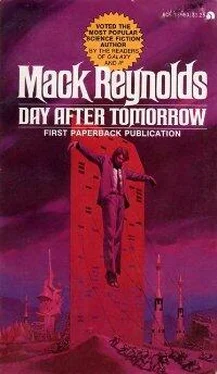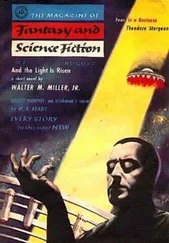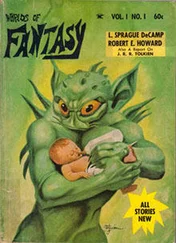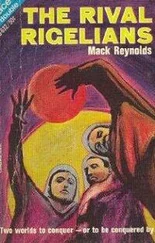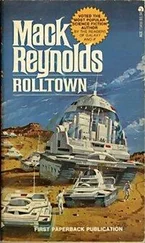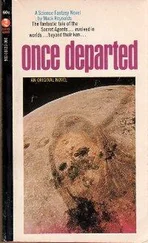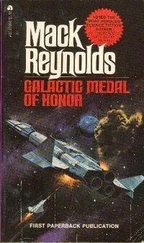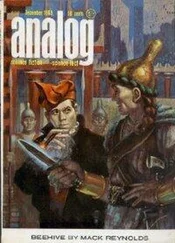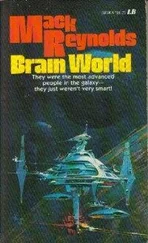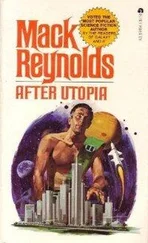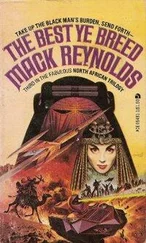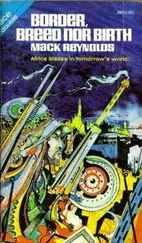Larry held up a hand. “Really,” he said. “My interest is in Ernest Self.”
The Professor relaxed. “Sorry, Mr. Woolford, I’m afraid I get carried away on this subject. Self, to get back to your original question, is a great intuitive scientist. Unfortunately for him, society being what it is today, he fits into few grooves. Our educational system was little more than an irritation to him and consequently he holds no degrees. Needless to say, this interferred with his gaining employment with the universities and the large corporations which dominate our country’s research, not to mention governmental agencies.
“Ernest Self holds none of the status labels that count. The fact that he is a genius means nothing. He is supposedly qualified no more than to hold a janitor’s position in laboratories where his inferiors conduct experiments in fields where he is a dozenfold more capable than they. No one is interested in his genius, they want to know what status labels are pinned to him. Ernest Self has no respect for labels.”
Larry Woolford figured he was picking up background and didn’t change the subject. “Just what do you mean by an intuitive scientist?”
“It’s a term I have used loosely, I am afraid,” the Professor admitted. “Possibly a scientist who makes a breakthrough in his field, destroying formerly held positions—in Self’s case, without the math, without the accepted theories to back him. He finds something that works, possibly without knowing how or why, and by using unorthodox analytical techniques. An intuitive scientist, if I may use the term, is a thorn in the side of our theoretical physicists laden down with their burden of status labels but who are themselves short of the makings of a Leonardo, a Newton, a Galileo, or even a Nicholas Christofilos.”
“I’m afraid that last name escapes me,” Larry said.
“Similar to Self’s case and Robert Goddard’s,” Voss said, his voice bitter. “Although his story has a better ending. Christofilos invented the strong-focusing principle that made possible the multi-billion-volt particle accelerators currently so widely used in nuclear physics experimentation. However, he was nothing but a Greek electrical systems engineer and the supposed experts turned him down on the grounds that his math was faulty. It seems that he submitted the idea in straight-algebra terms instead of differential equations. He finally won through after patenting the discovery and rubbing their noses in it. Previously, none of the physics journals would publish his paper—he didn’t have the right status labels to impress them.”
Larry said, almost with amusement, “You seem to have quite a phobia against the status label, as you call it. However, I don’t see how as complicated a world as ours could get along without it.”
The Professor snorted his contempt of that opinion. “Tell me,” he said, “to which class do you consider yourself to belong? What social strata?”
Larry Woolford shrugged. “I suppose individuals in my bracket, with my education, and my job are usually thought of as being middle-middle class. Given luck, as I grow older possibly I’ll be able to work myself up to upper-middle class.”
The other snorted again. “And you have no feeling of revolt in having such a label hung on you? Consider this system for a moment. You have lower-lower, middle-lower, and upper lower. Then you have lower-middle, middle-middle, upper-middle. Then you have lower-upper, middle-upper, and finally we achieve to upper-upper class. Now tell me, when we get to that rarified category, who do we find? Do we find an Einstein, a Schweitzer, a Picasso; outstanding scientists, humanitarians, the great writers, artists and musicians of our day? Certainly not. We find ultra-wealthy playboys and girls, a former king and his duchess who eke out their income by accepting fees to attend parties. We find the international bum set, bearers of meaningless feudalistic titles, or we find millionaires and billionaires, who achieved their wealth by inheriting it. These are your upper-upper class!”
Larry laughed.
The professor snapped, “You think it funny? Let me give you another example of our status label culture. I have a friend whom I have known since childhood. I would estimate that Charles has an I.Q. of approximately 90, certainly no more. His family, however, took such necessary steps as were needed to get Charles through public school. No great matter these days, you’ll admit, although on occasion he needed a bit of tutoring to pass his grades. On graduation, they recognized that the really better schools might be a bit difficult for Charles so he was entered in a college with a good name but without—shall we say—the highest of scholastic ratings. Charles plodded along, had some more tutoring, probably had his thesis ghosted, and eventually graduated with his first degree. At that point an uncle died and left a rather strange will. He left Charles an indefinite amount of money to be used in furthering his education to any extent he wished to go. Charles, probably motivated by the desire to avoid obtaining a job and competing with his fellow man, managed to wrangle himself into a medical school and eventually even graduated. Since funds were still available, he continued his studies abroad, largely in Vienna.”
The Professor wound it up. “Eventually, he ran out of schools, or his uncle’s estate ran out—I don’t know which came first. At any rate, my friend Charles, laden down with status labels, is today practicing as a psychiatrist in this fair city of ours.”
Larry stared at him blankly.
The Professor said snappishly, “So any time you feel you need to have your brains unscrambled, you can go to his office and expend fifty dollars an hour or so. His reputation is of the highest.” The Professor grunted his contempt. “He doesn’t know the difference between an aspirin tablet and a Rorschach test.”
Larry Woolford stirred in his chair. “We seem to have gotten off the subject. What has all this got to do with Ernest Self?”
The Professor seemed angry. “I repeat, I’m afraid I get carried away on this subject. I’m in revolt against a culture based on the status label. It eliminates the need to judge a man on his merits. To judge a person by the clothes he wears, the amount of money he possesses, the car he drives, the neighborhood in which he lives, the society he keeps, or even his ancestry, is out of the question in a vital, growing society. You wind up with nonentities as the leaders of your nation. In these days, we can’t afford it.”
He smiled suddenly, rather elfishly, at the security agent. “But admittedly, this deals with Ernest Self only as one of many victims of a culture based on status labels. Just what was it you wanted to know about Ernest?”
Larry said, “When you knew him, evidently he was working on rocket fuels. Have you any idea whether or not he later developed a method of producing perfect counterfeit?”
The Professor said, “You mean counterfeit money? Ernest Self? Surely you are jesting.”
Larry said unhappily, “Then here’s another question. Have you ever heard him mention belonging to a movement, or, I think, he might word it The Movement .”
“Movement?” the Professor said, scowling.
“Evidently a revolutionary group interested in the overthrow of the government.”
“Good heavens,” the Professor said. “Just a moment, Mr. Woolford. You interrupted me just as I was having my second cup of coffee. Do you mind if I…”
“Certainly not,” Larry Woolford shook his head.
“I simply can’t get along until after my third cup,” the Professor said. “You just wait a moment and I’ll bring the pot in here.”
He left Larry to sit in the combined study and living room while he shuffled off in his slippers to the kitchen. Larry Woolford decided that in his school days he had had some far-out professors himself, but it would really be something to study under this one. Not that the old boy didn’t have some points, of course. Almost all nonconformists base their particular peeves on some actuality, but in this case, what was the percentage? How could you buck the system? Particularly when, largely, it worked.
Читать дальше
